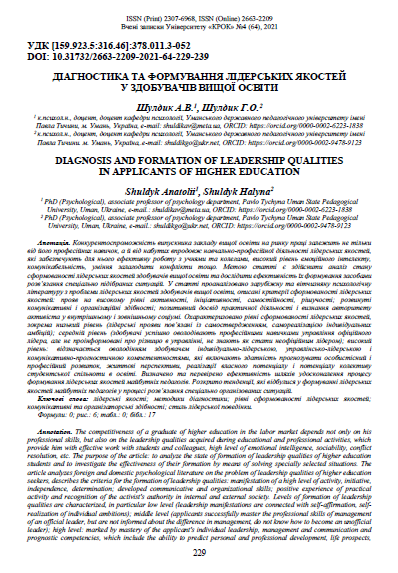DIAGNOSIS AND FORMATION OF LEADERSHIP QUALITIES IN APPLICANTS OF HIGHER EDUCATION
DOI:
https://doi.org/10.31732/2663-2209-2021-64-229-239Keywords:
leadership qualities, diagnostic techniques, levels of leadership skills, communication and organizational skills, leadership styleAbstract
The competitiveness of a graduate of higher education in the labor market depends not only on his professional skills, but also on the leadership qualities acquired during educational and professional activities, which provide him with effective work with students and colleagues, high level of emotional intelligence, sociability, conflict resolution, etc. The purpose of the article: to analyze the state of formation of leadership qualities of higher education students and to investigate the effectiveness of their formation by means of solving specially selected situations. The article analyzes foreign and domestic psychological literature on the problem of leadership qualities of higher education seekers, describes the criteria for the formation of leadership qualities: manifestation of a high level of activity, initiative, independence, determination; developed communicative and organizational skills; positive experience of practical activity and recognition of the activist's authority in internal and external society. Levels of formation of leadership qualities are characterized, in particular low level (leadership manifestations are connected with self-affirmation, self-realization of individual ambitions); middle level (applicants successfully master the professional skills of management of an official leader, but are not informed about the difference in management, do not know how to become an unofficial leader); high level: marked by mastery of the applicant's individual leadership, management and communication and prognostic competencies, which include the ability to predict personal and professional development, life prospects, realization of their own potential and the potential of the student community in education. The effectiveness of ways to improve the process of forming leadership qualities of future teachers has been identified and tested. The tendencies which have occurred in the formation of leadership qualities of future teachers in the process of solving specially organized situations are revealed.
Downloads
References
Мороз В. П. Сучасний погляд на проблему лідерства. Вісник Луганського національного університету імені Тараса Шевченка. Педагогічні науки. 2020. Вип. 2(333).Ч.2. С. 200–207.
Шапар В. Б. Сучасний тлумачний психологічний словник. Xарків : Прапор, 2007. 640 с.
Howell J. M., & Avolio B. J. Transformational leadership, transactional leadership, locus of control, and support for innovation: Key predictors of consolidated-business-unit performance. Journal of Applied Psychology. 1993. №78(6), Р. 891–902. DOI : https://doi.org/10.1037//0021-9010.78.6.891.
Басінская І., Радюк О., Нехвядовіч І. Ситуаційні й інтеракціоністські теорії лідерства. Науковий часопис НПУ імені МП Драгоманова. 2020 р. № 12. С. 5–23.
Вижва М. Сучасні теорії лідерства: гуманістичний ракурс. Проблеми сучасної психології. 2020. № 47. С. 9–26.
Кричевский Р. Л. Психология лидерства. 2007. 542 с.
Волкова Н. П., Наход С. А., Крижановська Г. І. До питання про лідерські якості викладача закладу вищої освіти та шляхи їх розвитку в умовах аспірантури. Вісник університету імені Альфреда Нобеля. Серія : Педагогіка і психологія. 2019. № 2 (18) С.30–39. URL: http ://nbuv.gov.ua/UJRN/vduep_2019_2_5.
Tal D., & Gordon A. Leadership of the present, current theories of multiple involvements: A bibliometric analysis. Scientometrics. 2016. Vol. 107(1). P. 259–269.
Галузяк В., Акімова, О., Громов, Є. Сучасні зарубіжні підходи до розуміння лідерства і виховання лідерів. Лідер. Еліта.Суспільство. 2019. №1. С. 32–53.
Радчук Г., Козак, О. Теорії лідерства в сучасному психологічному дискурсі. Збірник наукових праць ΛΌГOΣ. 2020. С. 109-112.
Романовський О. Г., Бондаренко В. В. Інноваційне формування повного спектру особистісних якостей лідера у всіх видах професійної діяльності на прикладі майбутніх психологів. Теорія і практика управління соціальними системами. 2017. № 2. С. 3–13.
Сингаївська І. В. Особистісні якості викладача як передумова його професійної успішності. Організаційна психологія. Економічна психологія. 2015. № 2. С. 86–93.
Schor, D. Experiential Leadership Training for Young Professionals. Ieee engineering management review. 2019. Vol. 45(3) P. 1–30.
Психодіагностика в службі зайнятості : методичний посібник / за ред. Синявського В. В., Яцишина О. О. Київ, 1998. С. 34-51.
Практическая психодиагностика. Методики и тесты : учебное пособие / сост. Д. Я. Райгородский. Самара : «БАХРАХ», 1998. С. 630-632.
Фетискин Н. П., Козлов В. В., Мануйлов Г. М. Социально-психологическая диагностика развития личности и малых групп. Москва, 2002. 339 с.
Бендас Т. В. Гендерная психология : учеб. пособ. СПб. : Питер, 2006. 431 с.



